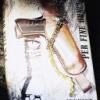"Another shot"? Anyone? 
I'm flattered by Mr. Blofeld's insistence on keeping this thread alive, though someday it will have to ride off into the sunset. In the meantime I shall desperately try to devise food for thought. Here's one avenue for exploration--how these three ages correspond to Bond's feelings toward women. This naturally brings up the notorious misogyny angle...
For some--like Alan Moore, who did his best to blacken Bond in
The League of Extraordinary Gentlemen: Black Dossier--"the overriding factor in James Bond's psychological makeup is his utter hatred and contempt for women." And this interpretation has become standard for many people. A widely consulted
site that annotates Moore's books says, "Bond is this hatefully misogynistic in the Ian Fleming books, if not in the films. And for them what don't believe me, or haven't read the Fleming books in a while, or at all, read
Scott Lynch's take on the subject."
Lynch's take is full of such profound statements as "Ian Fleming's James Bond is probably the single most relentlessly misogynistic character in twentieth century popular literature." He goes on to say that
Women (again with the single notable exception of Tracy) aren't people to Bond, they're single-function objects... impediments, sources of information, secretarial help, sex toys, or maternal fetish figures... Bond uses them to accomplish his missions, and/or uses them for sex, and/or uses them for recovery from harm...[Women] don't come back purring and begging for more because he's a skilled and attentive lover--they purr because he takes over completely and puts them in their place like nobody ever has before. Utter submission to a completely uncompromising man like Bond is an Edenic state for Fleming's women; the default, natural, blissful state of existence which other men, by treating them as adults with their own ambitions and needs, unthinkingly deny them.
I think anybody who has read the books with any amount of care will disagree with such frothing, but it's worthwhile to try and see why Lynch would think this way. Much of the tenor of his reading seems to be based on the first age of Bond, which I called "Blunt Instrument Bond (1953-1956)." In this incarnation, especially in
Casino Royale, Bond was deliberately portrayed as a cold, brutal figure. Many modern readers recoil from the various misogynistic statements Bond makes in the book, not quite realizing that many of these are in place to accentuate a hardness of character that will be utterly broken down toward the end. (And some remarks are heavily ironic--Bond's infamous speech about women doing mens' work when they go back to their pots and pans is clearly at Bond's expense: he doesn't realize that Vesper, far from being incompetent, actually arranged her own kidnapping.)
But let's also grant that none of the first three Bond heroines are particularly deep characters. Solitaire, who decides to run away with Bond in seconds, is perhaps the closest a Bond heroine comes to enacting the sort of one-dimensional relationship Lynch describes above. (Though I don't remember reading anything about Bond putting Gala Brand in her place.) But Bond's relationship with Tiffany is a prototype of his relationship with Tracy, which even Lynch has to make exceptions for.
And that relationship also informs Bond's later ones, as Bond moves into his "Almost Human Bond (1957-1961)" and "Suffering Bond (1961-1964)" periods. And those relationships belie the distortions Lynch peddles. Far from being slaves needing to be put into place, the women from 1957 onward tend to be birds with a wing down--women who either haven't had much sexual experience or have had horrible ones. And much of Bond's interaction with them isn't sexual but almost therapeutic. Consider those long passages where Bond does nothing but listen to the heroine tell her story and give supporting comments, such as Honeychile's tale of her upbringing, or Domino's explanation of what she thought the sky was like as a child, and her theory about the sailor on those Players cigarettes. Consider his long chat with Tiffany Case aboard the cruise ship. Consider his gentleness and solicitude toward Vivienne Michel as he guides her through the most harrowing ordeal of her life. And consider how often sex is delayed in these narratives--for a supposed sexual predator out to use women, Bond is surprisingly chivalrous. The only character I can think of as even approximating a "maternal fetish figure" is Kissy, and even then that's a stretch--after all, the irony in YOLT is that Kissy is using the amnesiac Bond as a useful husband. Talking about maternal figures in Fleming is bunk anyway, since the Bond books--unlike the Bond films--don't go in for the Madonna/Whore complex that still bedevils portrayals of women. In Fleming there are no juxtapositions of good-but-virginal versus bad-but-sexy women. The heroines of the novels are not subjugated to Bond, instead, like Vivienne, they have good sex and then go out into the world feeling more confident and in a better place. In his private life Ian Fleming was not a jealous man, and neither is Bond. The women he meets are free to resume their own lives.
***
Lynch later takes note of the scene from the film of
Casino Royale of Vesper witnessing Bond commit a brutal killing--she retreats into the shower and is comforted by Bond, who
treats her as a human being... a genuine adult human being with needs independent of his own sexual swagger. That's not Ian Fleming's Bond. That's nothing like Ian Fleming's Bond. The Fleming Bond would have slapped her. Frowning, muttering, thinking acidic thoughts about "silly creatures," he might even have yanked her to her feet and ![[censored]](https://debrief.commanderbond.net/topic/51662-the-three-ages-of-bond/style_emoticons/default/censored.gif) ed some "sense" back into the poor dizzy dame, and in Fleming's version of reality, that would have done the trick.
ed some "sense" back into the poor dizzy dame, and in Fleming's version of reality, that would have done the trick.
Now, in TMWTGG, Scaramanga shoots Tiffy's birds and sends the girl into hysterics, so Bond gives her a "couple of sharp slaps" on each cheek. This, is the only time in the books I can remember of Bond slapping a woman, and back then it was considered quite acceptable to slap anyone in hysterics. But if Lynch is correct, Bond would be irritated and bemoaning the sillyness of women. So what actually happens?
"Bond got to his feet. He took a cloth and wetted it at the tap, then leant down and put his arm around her and wiped the cloth gently over her face. Then he lifted her up and handed her the bag that was on a shelf behind the counter." He then tells Tiffy to put on a good face for the world and gives her money for her dead birds, before demanding that Scaramanga does so too. He warmly tells Tiffy goodbye when he leaves. Are these the actions of a character deaf to a woman's needs, who only wants to degrade them in bed? So much for Lynch's hateful fantasy then.
The Bond of TMWTGG is, as noted in my original post, a reboot Bond, a Bond that comes after the three ages I've discussed before, and seems to unify them. Regardless of whatever age we're talking about, Bond is a character whose relationships with women are, throughout the novels, above board and non-exploitive. There is nothing like disturbingly coercive seduction Sean Connery gives to Pussy Galore, or the angry slaps given to the movie versions of Tatiana and Tracy, or even the cold one given to Ms. Anders in the film of TMWTGG. Literary Bond's supposed misogyny is been derived from inner pronouncements like the ones in CR, not from the actual actions of his character.
Let's try a rough, somewhat cursory breakdown of Bond's relations with women, organized by the ages I've referred to.
01. Blunt Instrument Bond (1953-1956)
In
Casino Royale Bond is extremely harsh in his attitudes. Beyond denying the use of women in the field (on mistaken premises), Bond also makes that notorious "sweet tang" comment over Vesper's body. A puzzling remark, especially since we never get any indications of such rough stuff actually occurring. By the time of
Moonraker Bond no longer has any complaints about being paired up with a woman colleague (of sorts). He sneaks a kiss of Gala, but otherwise respects her.
Diamonds Are Forever marks the great thaw in Bond's personality--Bond comes to find himself increasingly considerate toward Tiffany's feelings, at one point even telling himself that he will have to be a sort of therapist to her.
02. Almost Human Bond (1957-1961)
Bond has almost limitless possibilities to use Tatiana in
From Russia With Love. Yet what comes out most strongly is his faith in her character. He admits that he's fallen for her and can't treat her as coldly as someone like Darko might. In
Doctor No Bond plays the role of the first decent man Honeychile has ever met. He listens to her life story with interest and feels horrible for endangering her. Once they're in Dr. NO's "mink-lined prison," her eagerness to bed him becomes sheer male fantasy, but Bond's forbearance isn't.
Goldfinger is an admittedly tough nut due to things Bond's linkage of women's lib to sexual confusion, or Bond making a lesbian turn straight through his sheer maleness. Such things are as retrograde, silly, and sexist as one can imagine, but GF is also the silliest and most self-parodic of the Bond novels. Let's consider it an aberration. In "For Your Eyes Only" BOnd initially grouses about Judy's mission of vengeance, but ultimately lets her perform it. He's there for her afterwards, in what is a quasi-paternal role.
03. Suffering Bond (1961-1964)
In
Thunderball Bond feels anguish at having to use Domino after realizing he's fallen in love with her. Though free of the excess neuroticism of Tiffany or Tracy, Domino projects a tough exterior, and part of Bond's courtship with her involves letting her know, by listening to her at her more vulnerable moments, that she can let down her guard with him. We get a flash of Bond's residual sexism when he compares her to an Arab mare needing to be broken to bridle and saddle, but this is exactly what Bond refrains from doing--by the end of the book Domino is still her take-charge self. In
The Spy Who Loved Me we have a resurgence of the bird-with-a-wing-down concept. Here Bond is practically a white knight, a fantasy figure who gives his help, enjoys a bit of sex, and is gone by daytime. Of special note is the help Bond occasionally requires from Vivienne--she is not just a damsel in distress. In
On Her Majesty's Secret Service we have the final reoccurrence of the
the bird-with-a-wing-down and Bond-as-therapist angle. Unfortunately Tracy became a much less interesting character after being cured. In
You Only Live Twice Bond has become a male bird-with-a-wing-down, and Kissy, the most self-sufficient female character in Fleming, offers him no what other Bond heroine has done before: a simple life in accord with nature, with an occupation of honest rustic toil. For the first time we see Bond acting as a husband (and one who works directly alongside his wife). I'm not going to discuss TMWTGG because it gives little to work with beyond the material discussed earlier.
And now for the most important part of this essay--when I ask for your thoughts and responses.
Edited by Revelator, 18 December 2010 - 10:33 AM.





